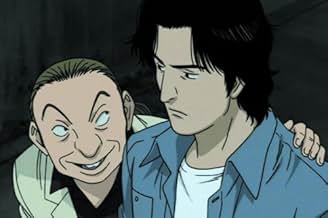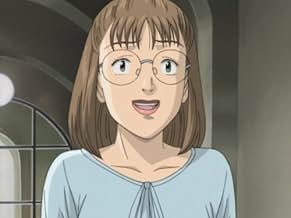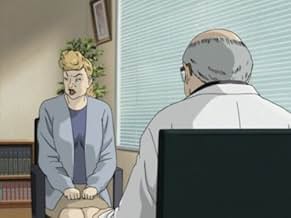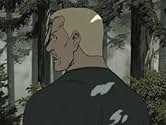Un brillante neurochirurgo che vive in Germania trova la sua vita in completo tumulto dopo essere stato coinvolto con uno psicopatico che era uno dei suoi pazienti.Un brillante neurochirurgo che vive in Germania trova la sua vita in completo tumulto dopo essere stato coinvolto con uno psicopatico che era uno dei suoi pazienti.Un brillante neurochirurgo che vive in Germania trova la sua vita in completo tumulto dopo essere stato coinvolto con uno psicopatico che era uno dei suoi pazienti.
Sfoglia gli episodi
Riepilogo
Reviewers say 'Monster' delves into profound themes such as morality and human nature, enhanced by psychological thriller elements. The intricate relationship between Dr. Tenma and Johan Liebert is pivotal. Characters are lauded for their complexity and realistic portrayals, supported by detailed backstories. The series is acclaimed for its sophisticated narrative, though some find the pacing sluggish and certain plot points repetitive. The realistic animation style and lack of supernatural elements are noted as distinctive features of the show.
Recensioni in evidenza
10hypernox
I've seen a lot of Animes and I have to say this is the best one in my opinion, a true masterpiece that goes beyond others. I liked Monster since its not a common Anime (japanese cartoon) since it doesn't evolve around supernatural abilities or Futeristic techs. The story is written in a way that make it feel very realistic. The realistic story also makes it a very scary story in a sense that the monsters in this story actually can exists, these are the real monsters we should be scared of.
Don't let the fact that its anime scare you off. Even if its hard to watch at first you'll get used to it, the story makes up for it. The story is so compelling that once you get into it it's hard to stop watching. I don't want to spoil any of plot more than it questions a common moral "all human life is equal worth". The plot really gets you thinking.
Don't let the fact that its anime scare you off. Even if its hard to watch at first you'll get used to it, the story makes up for it. The story is so compelling that once you get into it it's hard to stop watching. I don't want to spoil any of plot more than it questions a common moral "all human life is equal worth". The plot really gets you thinking.
I can't take the sadness why this anime ever ended?! I remember I felt deep emptiness when I finished it for the first time. As expected from Madhouse, Monster was a monster creation. Monster is my first work which I got to know of Naoki Urasawa. Monster is literally one of the best anime ever made.
I've watched a lot of anime, I've read a lot of manga, but Monster has managed to blow all of my former "favorites" out of the water. It manages to combine everything that's great about thrillers, mysteries, character studies, and psychological dramas all at once. The writing is superior, the direction is fantastic, and the way the story builds is slow but undoubtedly engaging. If Alfred Hitchcock had ever endeavored to create a serial work, it would be something like this.
The characters are all lovingly and soulfully rendered, and the show never seems to fall into the traps that even the best anime do - that is: needless fanservice, forced comedy, or ludicrous violence.
In addition, get ready for a history lesson. This story deals more with the social and political annals of 20th century Eastern Europe - ACCURATELY - than most classes on the subject.
The characters are all lovingly and soulfully rendered, and the show never seems to fall into the traps that even the best anime do - that is: needless fanservice, forced comedy, or ludicrous violence.
In addition, get ready for a history lesson. This story deals more with the social and political annals of 20th century Eastern Europe - ACCURATELY - than most classes on the subject.
This series held surprises into the very last episode.
I'm not really going to include any major spoilers for the series in my review. The closest that I'll come will cover what you've probably heard about from any general discussion concerning the TV series, or the books that the story comes from, or the opening TV credits for the very first episode. That means that some key elements from the first 4 episodes, which covers the first 5% of the 74 episode series, will be mentioned. But it's hard to even say what the series is about without going that far, and you're likely to get more spoilers in any major review of the latest Hollywood mega-release anyways.
In life, there are two types of monsters. The first is the type that most of us have probably thought of in our childhood, the type that we feared under the bed or in the closet, the type who our parents or guardians told us didn't exist. The second type, however, is what the title of this series refers to. This is the type which adults do fear, the type that does exist. This monster can plan human deaths with the same nonchalance that others have when they decide the details of getting their next coffee.
Naoki Urasawa's story is one that covers such a monster, but this monster isn't the main character. Instead, the main character is the highly skilled Japanese neurosurgeon Kenzou Tenma, working in Germany shortly after its reunification. Tenma believes that all life is of equal high worth, and that the value of life isn't changed with wealth, fame, nor with celebrity status. But he discovers that the hospital itself doesn't share that belief. The life that he saved, the life which more desperately needed his skills, looked so much like another anonymous life that was about to get wiped out by the hospital's lack of ethics. But Tenma unknowingly gave life back to a monster. And for the first time ever, Tenma regrets the life that he saved; so much so that he finds himself forced to correct that mistake.
From this point, if you saw the opening credits which cover the first 90 seconds of the very first episode, you can guess the general direction of the series. Picture the TV series 'The Fugitive', but with a single storyline which went from the first episode to the last. Now throw in a detective (Inspector Runge) who is as calm, confident, and calculating as the devil himself, pursuing Tenma. There are also other characters in the series, who are crucial to how the story builds, and who are rather difficult to introduce clearly without spoiling some of the many subplots which build through the series. These characters include Tenma's ex-fiancée Eva, as well as a retired detective, a reclusive billionaire, two criminal psychiatrists, members of organized crime, ones involved in possible illegal dealings with the Czech police, a crusading defense attorney, and others.
There will be a few times where the main storyline seems to be put on hold, and a new storyline with new characters will be introduced. And you'd likely be wondering why things have taken a detour, or when they'll get back to the actual story. But the overall plot is much more complex and detailed than you may have seen on other serial thrillers such as 'Alias', '24', or 'Lost'. The seemingly disjointed story lines in 'Monster' slowly build to be a critical part in the overall plot, and the series overall doesn't have any wasted scenes or episodes (filler), nor the jumps and jolts which betray signs of last minute rewrites.
If you're hoping that the upcoming Hollywood movie based on the series will be as good, you might want to reconsider. For starters, it'll mean rewriting a story which takes 37 broadcast hours to tell, and re-conveying that over a time slot of 90 to 100 minutes. Also, it'll be coming from the same talent pool which took the highly rated Japanese movies 'Ringu', 'Ju-On', and 'Shall We Dance', and turned them into the mediocre Hollywood productions 'The Ring', 'The Grudge', and 'Shall We Dance'. (From 94-64-79 to 72-40-49, according to RottenTomatoes.com.) While Hollywood can make a good original movie occasionally, their record at remaking movies leaves a lot to be desired.
In short, this is one of the better suspense stories out there. The writing is solid, the characters are believable (even when their character changes), and the story always makes sense. In some story arcs, just when you think they're getting ready to wrap things up, they find a way to ratchet up the tension again. But it never seems forced, or cheap, like what is by far more common in most thrillers I've seen. 'Monster' is definitely a series which requires your full attention when watching it, due to the pace which events happen and the number of details which all come together as the story progresses. And if you don't mind a long story with a lot of twists and turns, this is definitely one worth following.
I'm not really going to include any major spoilers for the series in my review. The closest that I'll come will cover what you've probably heard about from any general discussion concerning the TV series, or the books that the story comes from, or the opening TV credits for the very first episode. That means that some key elements from the first 4 episodes, which covers the first 5% of the 74 episode series, will be mentioned. But it's hard to even say what the series is about without going that far, and you're likely to get more spoilers in any major review of the latest Hollywood mega-release anyways.
In life, there are two types of monsters. The first is the type that most of us have probably thought of in our childhood, the type that we feared under the bed or in the closet, the type who our parents or guardians told us didn't exist. The second type, however, is what the title of this series refers to. This is the type which adults do fear, the type that does exist. This monster can plan human deaths with the same nonchalance that others have when they decide the details of getting their next coffee.
Naoki Urasawa's story is one that covers such a monster, but this monster isn't the main character. Instead, the main character is the highly skilled Japanese neurosurgeon Kenzou Tenma, working in Germany shortly after its reunification. Tenma believes that all life is of equal high worth, and that the value of life isn't changed with wealth, fame, nor with celebrity status. But he discovers that the hospital itself doesn't share that belief. The life that he saved, the life which more desperately needed his skills, looked so much like another anonymous life that was about to get wiped out by the hospital's lack of ethics. But Tenma unknowingly gave life back to a monster. And for the first time ever, Tenma regrets the life that he saved; so much so that he finds himself forced to correct that mistake.
From this point, if you saw the opening credits which cover the first 90 seconds of the very first episode, you can guess the general direction of the series. Picture the TV series 'The Fugitive', but with a single storyline which went from the first episode to the last. Now throw in a detective (Inspector Runge) who is as calm, confident, and calculating as the devil himself, pursuing Tenma. There are also other characters in the series, who are crucial to how the story builds, and who are rather difficult to introduce clearly without spoiling some of the many subplots which build through the series. These characters include Tenma's ex-fiancée Eva, as well as a retired detective, a reclusive billionaire, two criminal psychiatrists, members of organized crime, ones involved in possible illegal dealings with the Czech police, a crusading defense attorney, and others.
There will be a few times where the main storyline seems to be put on hold, and a new storyline with new characters will be introduced. And you'd likely be wondering why things have taken a detour, or when they'll get back to the actual story. But the overall plot is much more complex and detailed than you may have seen on other serial thrillers such as 'Alias', '24', or 'Lost'. The seemingly disjointed story lines in 'Monster' slowly build to be a critical part in the overall plot, and the series overall doesn't have any wasted scenes or episodes (filler), nor the jumps and jolts which betray signs of last minute rewrites.
If you're hoping that the upcoming Hollywood movie based on the series will be as good, you might want to reconsider. For starters, it'll mean rewriting a story which takes 37 broadcast hours to tell, and re-conveying that over a time slot of 90 to 100 minutes. Also, it'll be coming from the same talent pool which took the highly rated Japanese movies 'Ringu', 'Ju-On', and 'Shall We Dance', and turned them into the mediocre Hollywood productions 'The Ring', 'The Grudge', and 'Shall We Dance'. (From 94-64-79 to 72-40-49, according to RottenTomatoes.com.) While Hollywood can make a good original movie occasionally, their record at remaking movies leaves a lot to be desired.
In short, this is one of the better suspense stories out there. The writing is solid, the characters are believable (even when their character changes), and the story always makes sense. In some story arcs, just when you think they're getting ready to wrap things up, they find a way to ratchet up the tension again. But it never seems forced, or cheap, like what is by far more common in most thrillers I've seen. 'Monster' is definitely a series which requires your full attention when watching it, due to the pace which events happen and the number of details which all come together as the story progresses. And if you don't mind a long story with a lot of twists and turns, this is definitely one worth following.
People traditionally associate Japanese animes with the likes of Pokemon and Dragonball Z and it is often very difficult to convince non-anime fans that there's more to them. I'm no exception! Luckily, Monster was the third serial anime I was introduced to after Death Note and Fruits Basket (odd combos, I know). And to be honest, I was not expecting this.
The series starts off ordinarily with the traditional story of a doctor forced to prioritize between patients and his career. The story of two traumatized children is introduced along the way and things start becoming rather interesting. By the time I got to this point, I had completely forgotten I was watching an anime. See, in traditional Japanese animes (and no disrespect to the fans), the writers have no idea how to develop the dialogue and make it work with the story. The height of a character's shock will be repeating somebody's name in a low, gaspy/raspy voice. Among the millions of other queer things, I never got why anime writers felt that was a good emotional expression. I simply dismissed it as another odd Japanese behavior.
As a pleasant surprise, Monster does almost everything to stray from that. At so many points during the story, I wondered how brilliant this would've been as a non-animated series. The character development is interesting and not muggled up or confusing, the songs/music make sense for a change, there are no irritating characters trying to be funny and the plot keeps thickening ... although slowly, and that might be a flaw. But to be honest, the gradual development is what keeps you so attached to it.
So in conclusion, if you're a japanime fan and want to introduce the haters to the club, I highly recommend you make them watch this as their first ever anime. All in all, a 9.5/10 score. Definitely worth the watch!
The series starts off ordinarily with the traditional story of a doctor forced to prioritize between patients and his career. The story of two traumatized children is introduced along the way and things start becoming rather interesting. By the time I got to this point, I had completely forgotten I was watching an anime. See, in traditional Japanese animes (and no disrespect to the fans), the writers have no idea how to develop the dialogue and make it work with the story. The height of a character's shock will be repeating somebody's name in a low, gaspy/raspy voice. Among the millions of other queer things, I never got why anime writers felt that was a good emotional expression. I simply dismissed it as another odd Japanese behavior.
As a pleasant surprise, Monster does almost everything to stray from that. At so many points during the story, I wondered how brilliant this would've been as a non-animated series. The character development is interesting and not muggled up or confusing, the songs/music make sense for a change, there are no irritating characters trying to be funny and the plot keeps thickening ... although slowly, and that might be a flaw. But to be honest, the gradual development is what keeps you so attached to it.
So in conclusion, if you're a japanime fan and want to introduce the haters to the club, I highly recommend you make them watch this as their first ever anime. All in all, a 9.5/10 score. Definitely worth the watch!
IMDb's Top 50 Anime Series
IMDb's Top 50 Anime Series
See which anime series our fans recommend the most. Titles with more than 10,000 votes are featured in our ultimate anime watchlist.
Lo sapevi?
- QuizDr. Reichwein's files on patients (seen when he looks for Richard's) include files on "supposed" patients named Werner Herzog, Wim Wenders (as "Wilhelm E. Wenders"), Nastassja Kinski, Wolfgang Becker (as "Wolfgang Becker") and Bruno Ganz
- Citazioni
Eve Heinemann: I want the biggest one you can give me.
Gun seller: A beginner can't handle a big gun. What are you trying to shoot?
Eve Heinemann: A real devil.
- Versioni alternativeSyfy and Chiller airings removed sex scenes and nudity, and the implications of rape were removed in episode 49.
- ConnessioniRemade as Monster
- Colonne sonoreGrain
Composed & arranged by Kuniaki Haishima
I più visti
Accedi per valutare e creare un elenco di titoli salvati per ottenere consigli personalizzati
- How many seasons does Monster have?Powered by Alexa
Dettagli
Contribuisci a questa pagina
Suggerisci una modifica o aggiungi i contenuti mancanti

































